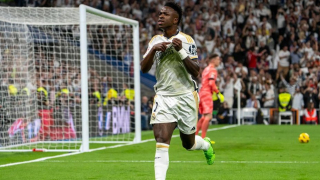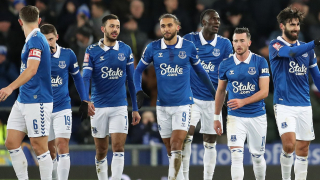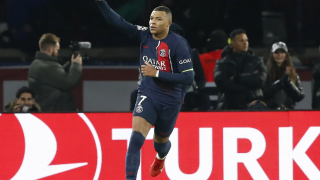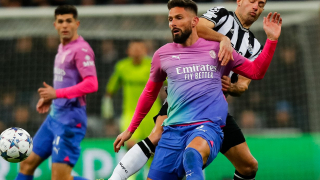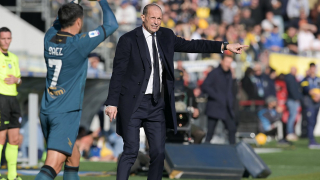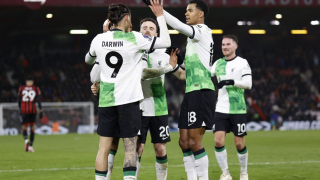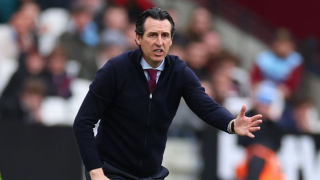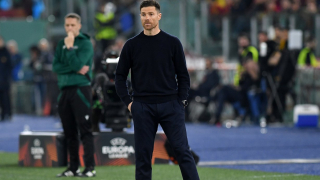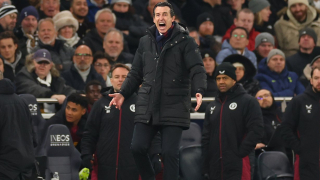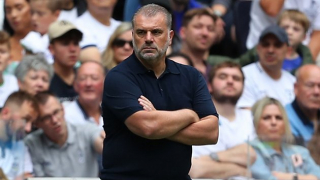Manchester City's thumping victory over Huddersfield Town, followed shortly after by Brighton & Hove Albion's victory over Manchester United, could hardly have painted Pep Guardiola and Jose Mourinho in more different lights.
Talk of a title challenge at Old Trafford disintegrated on Sunday, but fortunately a stoically impressive 2-0 win at Selhurst Park for Liverpool on Monday evening has kept the Premier League competitive – for now.
Arsenal and Chelsea showed serious flaws on Saturday evening in a game that, on a weekend with 35 goals, epitomised the overall shape of the season: clubs with stability are starting the campaign considerably better than those with new managers and new players.
Here are three things we learnt from the weekend action:
1) Pellegrini's litany of errors exposes top-heavy West Ham's soft midfield
In a weekend of defensive mistakes and difficulties arising from managerial changes, the manner of West Ham United's defeat to Bournemouth was the easiest to see coming. Manuel Pellegrini's 4-4-2 formation was predictably far too light in central midfield, while the wingers didn't track back enough to support their full-backs. The Chilean won't be making that mistake again.
Mark Noble and Jack Wilshere are far too slow and poor positionally to function together in midfield, especially in a system that allows the wingers to push on, exposing the midfielders to the entire width of the pitch. Felipe Anderson rarely bothered to track back, which is why Adam Smith dominated down that side, and yet this is hardly news. It is worrying for Hammers fans that Pellegrini ever thought it possible to pick such an attacking lineup.
But of even greater concern is the ruthlessness with which Bournemouth made them pay. David Brooks and Ryan Fraser consistently cut inside to create overloads in the number ten zone, while Callum Wilson and Joshua King both repeatedly dropped off into the same area. Clearly Eddie Howe had prepared for West Ham's softness in the middle – just as all of their opponents will this season. It could be another trying year in east London.
2) Arsenal's confused high line & Chelsea's shaky back four suggest awkward transitional seasons for both clubs
A thoroughly entertaining game at Stamford Bridge was notable more for the structural flaws in both clubs than incisive attacking play, highlighting the problems both Unai Emery and Maurizio Sarri will have in their first season in English football. Judging by Saturday's game, a top four finish looks like a stretch for both clubs.
Arsenal held an extremely high defensive line and yet didn't press the ball, a calamitous mismatch of different tactics that inevitably allowed Chelsea to clip balls over the top (particularly since neither Shkodran Mustafi nor Sokratis Papastathopoulos are particularly quick). Their passing out from the back got them in trouble too, while Chelsea dominated down their left thanks to another poor defensive performance from Henrikh Mkhitaryan.
Chelsea were just as flawed. Moving to a back four has proved tricky for Antonio Rudiger and David Luiz, both of whom looked clumsy once again, but a new issue on Saturday was the prevalence of Arsenal's cut backs from the byline. The visitors should have scored four first-half goals from this simple move. N'Golo Kante's switch to a more attacking role has created a new pocket of space in the D, while Marcos Alonso is struggling as a left-back; he was caught too high up the pitch over and over again.
3) United's dreadful performance shows the importance of psychology if you don't coach attacking patterns
Manchester United's problems are numerous and every single one seems to mirror the whirlpool of errors that engulfed Chelsea in the autumn of 2015. Jose Mourinho has thrown his players under the bus and now their confidence is shot; has failed to coach them intricate attacking patterns and now they look clueless in the final third. These two issues are intimately related to each other.
Setting aside the dreadful performances from Fred, Victor Lindelof, and Eric Bailly in the first half, United should have been able to muster more than two shots on target (including the late penalty) in the second period. The reason they couldn't is that Mourinho doesn't coach attacks, instead leaving it to his forwards to improvise. This is in direct contrast to Pep Guardiola and Mauricio Pochettino, for example, who use rote learning to show the players how to link and make space in the final third.
Mourinho's approach works when confidence is high, but when players are riddled with self-doubt they need to be able to fall back on muscle memory, to put trust in a manager and switch their brains off. United's players don't believe in themselves at the moment, and so it is hardly surprising they aren't showing bravery in their movement or risk-taking in their passing.
Best of the Week – Liverpool's defensive performance
In such a physical battle against a well-organised and confident counter-attacking Crystal Palace, Liverpool would not have won last season. It is a testament to their newfound resolve – the sort of mental and physical strength that wins titles – that Liverpool ran out 2-0 winners at Selhurst Park on Monday.
Naby Keita was deployed on the left of midfield and in a more withdrawn role on Monday, a position that helped shut down counter-attacks led by Aaron Wan-Bissaka. Virgil van Dijk dominated Christian Benteke and James Milner had another exceptional game shutting down Wilfried Zaha. Liverpool in 2018/19 is a powerful and imposing team in defence, which should could help them bridge the gap to Man City.
Worst of the Week - Huddersfield Town
Caught between pressing bravely and sitting off, between a flat back five and a more fluid back three, a long-ball approach and carefully worked counter-attacks, David Wagner's Huddersfield were clueless against Man City. They could hardly have played worse or done less to halt their opponents.
Man City deserve credit for learning from their draw against Huddersfield last season and playing in a whole new way. Pep Guardiola used a 3-5-2 that focused on peppering the box with crosses from wide positions (Benjamin Mendy attempted 12 in total), the idea being to stop the hosts from defending comfortably in a narrow blockade. It certainly worked.

